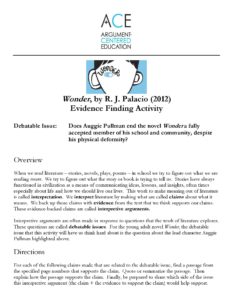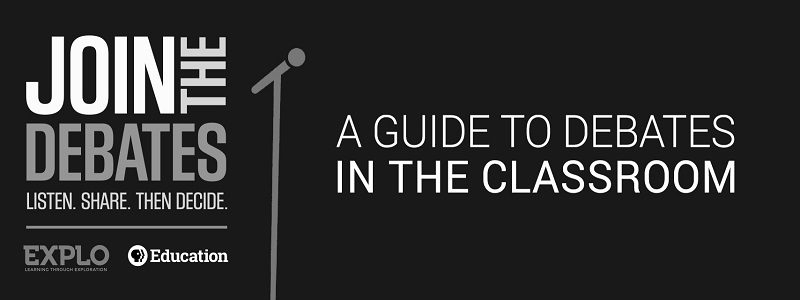‘Wonder’ and Evidence Finding
One of our partner middle schools is doing a unit on R. J. Palacio’s 2012 young adult novel, Wonder, winner of multiple accolades, including the 2015 Mark Twain Reader’s Award. We designed an argument-centered culminating project around the Evidence Finder Activity.

Disrupt the Debate! A Twitter Activity on the 2016 Presidential Debates
Overview
The word “disrupt” had until fairly recently a strictly negative connotation. A business strategy could be disrupted by political unrest in a trading partner country; a classroom could be derailed by a disruptive student. While those meanings haven’t been erased, the 21st century has introduced a positive meaning of disrupt: to break through calcified tradition or habit in order to make room for new voices or influences. In this activity students are going to use Twitter to inject their fresh voice into the presidential debates, which can be seen as somewhat self-sealed, media-manufactured events far removed from participatory democracy. Using Twitter to reflect on the presidential debates through an argument-related lens, students are going to disrupt the debates!
SPAR Debate: A Format for Rigorous, Real, Ready-to-Go Debating in Class
Overview
SPAR Debate is an excellent way to introduce students to debating in the classroom. It’s an activity for getting students initially exposed to debating, but also for isolating and introducing the key elements of academic argumentation.
SPAR is short for Spontaneous Argumentation debates. The term connotes, too, some of the jousting and practicing that we think of as “sparring.” SPAR Debate can be used with minimal research, and is therefore a very good format for getting students up and arguing. SPAR Debate can be used with academic issues, as a way to begin to immerse students in curricular content, or with non-academic (“fun”) issues, as a way to focus on debating format and individual argumentation skills.
Review of PBS Learning Media Election Central Resources
PBS Learning Media just posted its 2016 Presidential Debates curricular resources.
Its collaboration with We the Voters (an advocacy group formed by persons in the media concerned with civic and voter engagement, especially among teens and young adults) emphasizes rhetorical techniques — e.g., ad hominem attacks, sowing doubt, false equivalency — debaters use to evade rigorous argumentation.
Document-Based Argument Writing: Immigration from the Middle East
This is an argument-centered writing assessment designed to develop students’ critical thinking and writing skills, in an in-class and on-demand setting. Both because of the college-directed rigor of the preparatory work that students will be immersed in, and because of the conditions under which students will be writing, this assessment is also highly aligned with the new SAT exam, so it is an authentic, properly embedded and seamless part of an instructional strategy that has raising students’ college exam scores as one of its objectives. And finally it is document-based, so it parallels the kind of AP Exam writing that many students will be striving to master.
Issue: The United States should significantly restrict immigration from the Middle Eastern due to the possibility of terrorism.






